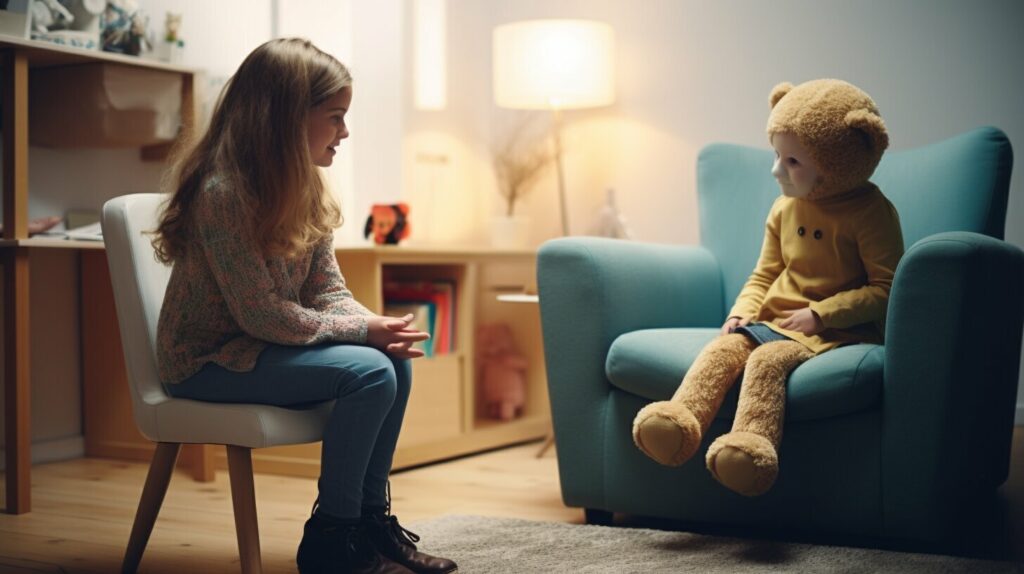Explaining betrayal to a child can be a difficult and sensitive subject. Betrayal can shake a child’s trust in people and relationships and have lasting effects on their emotional well-being. As a parent or caregiver, it’s important to have open communication and approach the topic with empathy and understanding.
This guide will provide strategies and tips for explaining betrayal to children, creating a safe space for discussion, and promoting resilience and healthy relationships.
Key Takeaways:
- Explaining betrayal to a child requires empathy and understanding.
- Betrayal can have lasting effects on a child’s emotional well-being and relationships.
- Creating a safe space for discussion and promoting resilience can help children navigate betrayal.
Why it’s Important to Talk to Children About Betrayal
As a parent or caregiver, it can be challenging to discuss difficult topics with children. However, when it comes to betrayal, open and honest communication is crucial for a child’s emotional well-being. Ignoring the conversation or brushing it off may cause the child to feel isolated and unsupported.
Betrayal can have a significant impact on a child’s mental health and relationships. Without guidance, they may struggle to understand and cope with the feelings of anger, sadness, or confusion that follow a betrayal. In some cases, they may even blame themselves for the actions of others.
Talking to children about betrayal can help them process their emotions in a healthy way. By promoting open dialogue, you can create a safe space for them to express their feelings and find comfort in knowing that they are not alone. Additionally, discussing betrayal can help children develop trust and empathy, which are essential skills for building healthy relationships in the future.
Ultimately, addressing betrayal with children is necessary for their emotional growth and well-being. By having an honest conversation, you can equip them with the tools they need to navigate trust, relationships, and challenging experiences in life.

Understanding Betrayal: Age-Appropriate Explanation for Children
Explaining betrayal to a child can be challenging, but it’s important to approach the subject in a way that is suited to their age and developmental stage. Here are some tips for helping your child better understand betrayal:
- Keep it simple. Use language that your child can understand. For younger children, explain betrayal as someone breaking a promise or doing something that hurts them on purpose.
- Use concrete examples. Give real-life examples of betrayal that your child can relate to, such as a friend lying to them or someone stealing their toy.
- Focus on their feelings. Encourage your child to express how they feel about the betrayal. Validate their emotions and let them know that it’s okay to be upset or angry.
It’s important to help your child understand that betrayal is a part of life, but it doesn’t have to define their relationships. By teaching them how to recognize and cope with betrayal, you can help them develop the resilience and emotional intelligence needed for healthy relationships in the future.

Creating a Safe Space for Discussion: Establishing Trust and Openness
When discussing betrayal with your child, it is important to create a safe and supportive environment where your child feels comfortable expressing their emotions and thoughts. Fostering trust and openness is crucial in building a strong foundation for communication.
Active listening is key to establishing this safe space. Ensure that you are fully present and attentive when your child speaks, giving them your full attention and validating their feelings. It is natural for children to feel angry, sad, or confused when grappling with betrayal, and it is important to let them know that their emotions are valid and understandable.
Encourage your child to express their thoughts and emotions in a non-judgmental way. You can provide prompts or questions to facilitate discussion, such as “What does betrayal mean to you?” or “How do you feel about what happened?”. Allow your child to express themselves in their own way, without interrupting or criticizing them.
It is also important to validate your child’s emotions when they are upset. Using phrases like “I understand how you feel” or “It’s okay to be upset” can help your child feel heard and supported.
Remember, creating a safe space for discussion is an ongoing process. Keep communication open and consistently demonstrate that you are a reliable source of support and guidance for your child.

Teaching Children about Trust and Betrayal: Building Resilience
Explaining betrayal to children can be a difficult task, but it is crucial for their emotional growth and development. Teaching children about trust and betrayal can help them recognize the boundaries of trust and build resilience.
Start by discussing the concept of trust with your child, emphasizing the importance of keeping promises and being honest. Use examples from daily life to illustrate trust, such as how you rely on your child to brush their teeth before bed every night.
Once your child understands the importance of trust, explain what betrayal is in a way that is age-appropriate. Use simple language and provide concrete examples, such as a friend who promises to keep a secret but tells others anyway.
Teach your child to recognize signs of betrayal, such as someone who consistently lies or breaks promises. Discuss how to set boundaries and protect oneself from potential betrayal.
Help your child develop resilience by encouraging them to speak up when they feel betrayed and providing support and validation. Emphasize the importance of forgiveness and empathy, but also the value of learning from negative experiences and setting healthy boundaries in the future.

Remember, teaching children about trust and betrayal is an ongoing process. Continuously reinforce the importance of trust and honesty in relationships and provide guidance and support when necessary.
Validating Emotions: Helping Children Express and Process Betrayal
When a child experiences betrayal, it can be overwhelming and confusing. As a parent or caregiver, it’s crucial to validate their emotions and provide a safe space for them to express their feelings.
One way to validate their emotions is to actively listen to what they have to say. Acknowledge their pain and let them know that what they’re feeling is normal and understandable. Empathize with them and show that you understand what they’re going through. This can help them feel heard and supported.
“I know this hurts and it’s okay to feel angry or sad. I’m here for you and we’ll get through this together.”
In addition to validating their emotions, it’s important to help children process their feelings. Encourage them to express their emotions and offer coping strategies that can help them deal with their anger or sadness. For example, you can suggest writing in a journal, talking to a trusted friend or family member, or engaging in physical activities like exercise or sports.
“It’s okay to cry and let out your feelings. How about we go for a walk or play a game to help you feel better?”
Remember that every child processes emotions differently and may need different types of support. Be patient and understanding, and continue to provide a safe and supportive environment for them to work through their feelings.

“When children are able to express their emotions and feel validated, it can help them process their experiences and develop healthier coping mechanisms.”
Nurturing Healthy Relationships: Rebuilding Trust After Betrayal
After experiencing betrayal, it can be challenging to rebuild trust and nurture healthy relationships. However, with patience, empathy, and effort, it is possible to mend broken bonds and move forward in a positive direction.
One of the most crucial steps to rebuilding trust is setting clear boundaries and expectations. Encourage your child to communicate their needs and concerns openly and honestly, and be receptive to their feedback. This can help establish a sense of mutual respect and understanding, which is essential for a healthy relationship.
Forgiveness and empathy are also critical components of rebuilding trust. Encourage your child to express their emotions and validate their feelings, while also emphasizing the importance of understanding the perspective of the person who betrayed them. This can help cultivate a mindset of compassion and promote healing.
It’s important to note that rebuilding trust takes time and effort, and there may be setbacks along the way. However, by continuing to communicate openly, practice empathy, and prioritize respect and understanding, you and your child can work towards nurturing healthy relationships and moving forward in a positive direction.

In the next section, we will explore the circumstances in which involving a therapist or counselor may be beneficial.
Seeking Professional Help: When to Involve a Therapist or Counselor
While helping your child navigate betrayal, it is important to recognize when professional intervention may be necessary. A therapist or counselor can provide specialized support and guidance to help your child process their emotions and develop coping strategies. Here are some signs that it may be time to involve a professional:
- Your child is experiencing intense and prolonged emotional distress, such as anxiety or depression
- Your child is exhibiting changes in behavior, such as withdrawal or aggression
- Your child is struggling with trust issues in multiple areas of their life
- Your child is displaying symptoms of trauma, such as flashbacks or nightmares
It is important to find a therapist or counselor who has experience working with children and who your child feels comfortable talking to. Your child’s pediatrician or school counselor may be able to provide recommendations. You can also search for therapists in your area through online directories or contact your insurance provider to find in-network options.
Remember that seeking professional help is not a sign of weakness, but rather a proactive step towards supporting your child’s emotional well-being. By working with a therapist or counselor, your child can gain valuable tools and insights to help them process their emotions and build resilience in the face of betrayal.

Real-Life Examples: Using Stories and Role-Playing to Explain Betrayal
Children often respond well to stories and role-playing when it comes to understanding complex emotions and experiences. Using age-appropriate examples, you can help your child explore the concept of betrayal and develop empathy for others.
Reading books that tackle themes of trust, friendships, and betrayal can be a powerful way to start a conversation with your child. Choose stories that resonate with your child’s interests and age group. For younger children, picture books such as “The Rainbow Fish” by Marcus Pfister or “The Adventures of Beekle: The Unimaginary Friend” by Dan Santat can provide valuable lessons on friendship and loyalty.

For older children, chapter books such as “Wonder” by R.J. Palacio or “Bridge to Terabithia” by Katherine Paterson can offer a deeper exploration of complex emotions and relationships.
Role-playing is another effective tool for helping children understand betrayal. You can take on different roles and act out scenarios with your child, modeling healthy communication and conflict resolution. For example, you can pretend to be a friend who breaks a promise or keeps a secret, and then work with your child to come up with possible reactions and solutions.
Remember to keep the focus on the learning experience, and not on any specific personal experiences that may be too close to home. Encourage your child to ask questions and express their thoughts and feelings.
Teaching Children about Trust and Betrayal: Building Resilience
When explaining betrayal to a child, it’s important to also teach them about trust and how to recognize the boundaries of trust in their relationships. This can help them develop resilience and safeguard against future experiences of betrayal.
Start by defining trust in simple terms that a child can understand. Emphasize how trust is built over time through honesty and consistency in actions. You can also use examples of trustworthy relationships in their life, such as a pet or a best friend.
Once they have an understanding of trust, introduce the concept of betrayal and how it can break down trust. Provide examples of different types of betrayal, such as lying or breaking a promise, and discuss how it can impact a person’s emotions and well-being.
Encourage your child to recognize the signs of betrayal in their own relationships. Teach them to trust their instincts and communicate openly with you or another trusted adult if they feel someone has betrayed their trust.
Building resilience after experiencing betrayal involves learning from the experience and taking steps to protect oneself from future hurt. Encourage your child to set boundaries in their relationships and to communicate their needs and expectations clearly. Remind them that trust is built over time and that it’s okay to be cautious with new relationships.
Ultimately, teaching children about trust and betrayal can help them develop the skills they need to build healthy, fulfilling relationships in the future.

Conclusion
Congratulations on completing this guide on explaining betrayal to a child. By prioritizing open communication, empathy, and support, you are equipping your child with the tools to navigate trust and relationships. Remember, discussing betrayal with children can be difficult, but it is an essential part of their emotional growth and well-being.
As you move forward, continue to prioritize creating a safe and supportive environment for your child to express their emotions and process their experiences. Remember to validate their feelings and provide them with age-appropriate explanations and resources.
If you ever feel overwhelmed or unsure of how to proceed, don’t hesitate to seek the help of a qualified therapist or counselor. It’s okay to ask for help, and they can provide valuable support and guidance as you and your child navigate through the healing process.
Thank you for taking the time to invest in your child’s emotional well-being. With your support and guidance, they will grow to be resilient, empathetic, and capable of building healthy relationships.
Why is it Important to Teach Children about Sincerity Before Understanding Betrayal?
Teaching children about sincerity in their early years lays a strong foundation for understanding betrayal later in life. Explaining sincerity to a child helps them develop empathy, integrity, and trust in relationships. By emphasizing the importance of honesty and genuine intentions, we equip them with the tools to navigate complex emotions that arise from instances of betrayal, fostering resilience and emotional intelligence as they grow.
FAQ
Q: How do I explain betrayal to a child?
A: Explaining betrayal to a child can be challenging, but it’s important to be honest and age-appropriate. Start by using simple language and concepts that they can understand. Focus on validating their emotions and helping them process their feelings. Read more
Q: Why is it important to talk to children about betrayal?
A: Talking to children about betrayal is crucial because it helps them understand their emotions, develop resilience, and navigate future relationships. When children are aware of betrayal and its impact, they can build healthier boundaries and make informed choices. Read more
Q: How can I create a safe space for discussing betrayal with my child?
A: Creating a safe space for discussion involves establishing trust, active listening, and validating their emotions. Make sure your child feels comfortable expressing their feelings and assure them that their thoughts and experiences are valid and valued. Read more
Q: What are some strategies for helping children process betrayal?
A: Helping children process betrayal involves validating their emotions, providing a listening ear, and assisting them in expressing their feelings. Encourage healthy coping mechanisms such as engaging in creative activities, journaling, or talking to a trusted adult. Read more
Q: How can I rebuild trust with my child after betrayal?
A: Rebuilding trust after betrayal requires open communication, setting boundaries, and promoting forgiveness and empathy. It’s crucial to establish a safe and supportive environment where your child feels heard, valued, and respected. Read more
Q: When should I involve a therapist or counselor?
A: Involving a therapist or counselor may be beneficial if your child is struggling to cope with the effects of betrayal, experiencing severe emotional distress, or if the betrayal has significantly impacted their relationships or daily functioning. Read more
Q: How can stories and role-playing help explain betrayal to children?
A: Stories and role-playing can be effective tools for explaining betrayal as they engage children’s imagination and help them relate to different situations and emotions. Using age-appropriate stories and role-playing scenarios can facilitate understanding and empathy. Read more
Q: How can children heal and grow after experiencing betrayal?
A: Children can heal and grow after betrayal by developing resilience, learning from their experiences, and building healthier future relationships. Encourage them to reflect on their emotions, seek support when needed, and focus on personal growth. Read more






